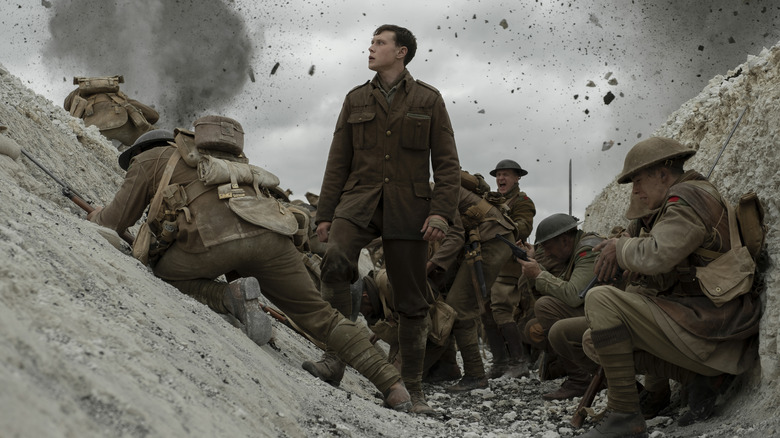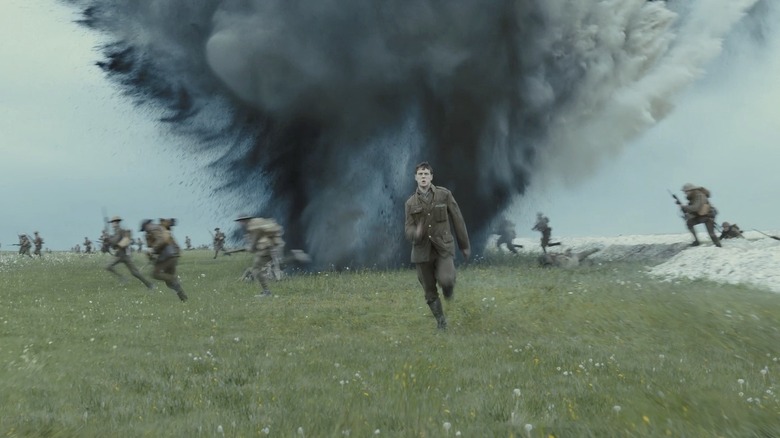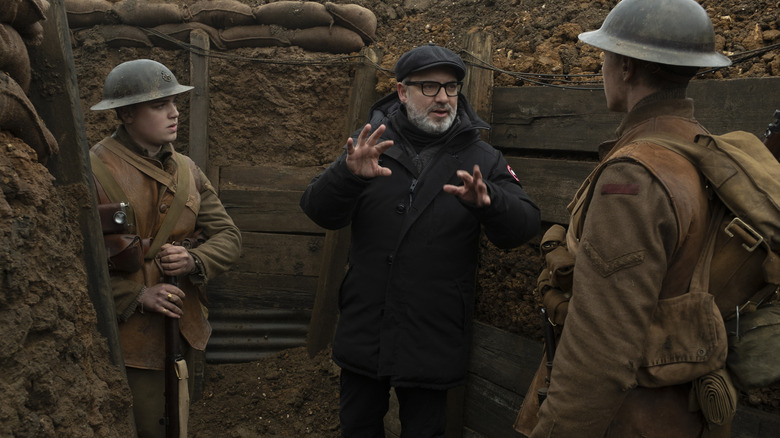George Mackay's Most Memorable Moment In 1917 Was A Complete Accident
Regardless of any given movie's scope and scale, an unquantifiable alchemy of forethought, precision, adaptability, and luck is required each and every time a filmmaker and their massive team of collaborators turn a screenplay into a living, breathing movie. Take just one minute to think about the sheer amount of factors that need to go right throughout every stage of a film's production, and you'll likely gain a much greater appreciation for the ones that make it to the finish line and somehow, against all odds, actually exceed all expectations.
As if that uphill battle weren't challenging enough, some brave (possibly foolhardy?) filmmakers go even further and impose certain restrictions on themselves — ideally in service of nothing more than the script itself, but other times in transparent attempts to curry awards favor. In the wake of this year's Oscars, memories of "The Revenant" making a bold awards push on the (perceived) strength of little more than how difficult it was to pull off will inevitably come to mind.
Director Sam Mendes' World War I-set "1917" elicited plenty of passionate and opinionated hot takes when it released in 2019. Some argued that a prestige and big-budget war film from a widely respected filmmaker boasting one very noticeable "gimmick" — the appearance of the movie filmed in two unbroken takes — clearly made the film little more than Oscar-bait. Well-made and technically proficient, of course, but Oscar-bait nonetheless. Others maintained that the use of such a neat filmmaking trick was perfectly justified by the story, which followed two weary soldiers (Dean-Charles Chapman as Lance Corporal Blake and George MacKay as Lance Corporal Schofield) sent on an impossible task — importantly, one meant to prevent more bloodshed, not exacerbate it.
Regardless, the obstacles and challenges the team behind "1917" had to overcome also included the filming of one climactic scene at arguably the most crucial point of the entire film. The fact that it almost went completely awry only makes the finished product that much more impressive.
'A sort of movie magic'
After an arduous journey through "No Man's Land" and behind enemy lines in war-torn Europe, Schofield narrowly finds himself exactly where he needs to be ... though with time now serving as his biggest foe. Armed with orders to prevent a doomed attack on enemy forces, Schofield is informed that the first wave of soldiers are already prepping to charge across the deadly field and, in all likelihood, will meet a bloody end. The commanding officers who are capable of calling off the battle can only be reached by a frantic sprint in front of the trenches and with absolutely no cover whatsoever. In the moment that the entire film has been quietly building to, a frantic and desperate Schofield recklessly mounts the trench and purposefully begins his final trek to either accomplish his mission or perish in the attempt.
In the final film, viewers couldn't miss the two separate occasions where actor George MacKay collides with an extra while charging across the vast and chaotic expanse of bodies and controlled explosions. But rather than ruin the expensive and time-consuming take, MacKay simply picks himself up and continues on his way.
For Krysty Wilson-Kairns ("Last Night in Soho"), it was an unforgettable moment. In an interview with CinemaBlend, the "1917" screenwriter explained:
"500 of us [were] sitting there, all backstage, behind the scenes, watching it get filmed. I remember when George fell down, I screamed. It was like watching your team mess up a field goal at the Super Bowl. I just remember Sam Mendes screaming, 'He's up! He's up! Keep filming!' And out of that came a sort of movie magic, I think, personally. I'm obviously a little biased, but it's one of my favorite scenes of the film. And I think, I wish I wrote that. I actually said that to George after ... It's life talking back to you. It's very satisfying to be able to be on a film where that can happen."
All's well...
As it turns out, the (barely) controlled chaos of "1917" proved to be a perfect match for such a moment making it into the final film purely by happenstance. Rather than ruining the ambitions of everyone involved, the dramatic moment only added to the end goal by injecting some downright human flaws into a story that was very much about a pair of friends attempting to navigate human flaws — both their own and those of their commanding officers, wading headlong into a fight that couldn't be won — and rise above them.
By allowing such a spontaneous example of the unpredictability of filmmaking into the final cut, Mendes and the rest of his creative team proved their willingness to, as Wilson-Kairns put it so eloquently, let "...life [talk] back to you." Not even a director of Mendes' caliber could anticipate such a perfect summation of MacKay's character, putting him in the position of needing to overcome a final series of seemingly insurmountable odds — even by his fellow allies and soldiers — in a sequence that had already been splashed as a main selling point throughout the film's lengthy marketing cycle. By the time the film ends and brings things full-circle, with Schofield laying down out of pure exhaustion in a peaceful field that mirrors the movie's opening minutes, the character's parting shot feels as well-earned as it could possibly be.
Though MacKay's very real tumbles at such an important point could easily be dismissed as only a minor snafu, the effect it has on the overall film ultimately feels immeasurable. No matter how much planning goes into a movie on the level of "1917," completely unforeseen moments of moviemaking (im)perfection helped turn this ambitious war film into a study of how magic can come from moments of near-disaster.


